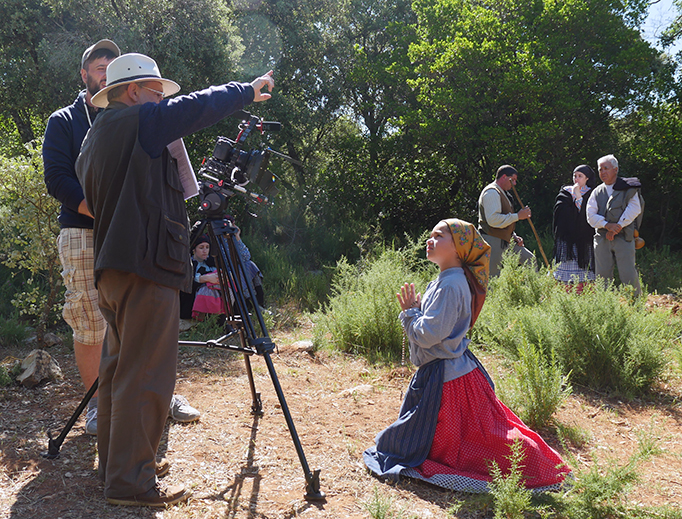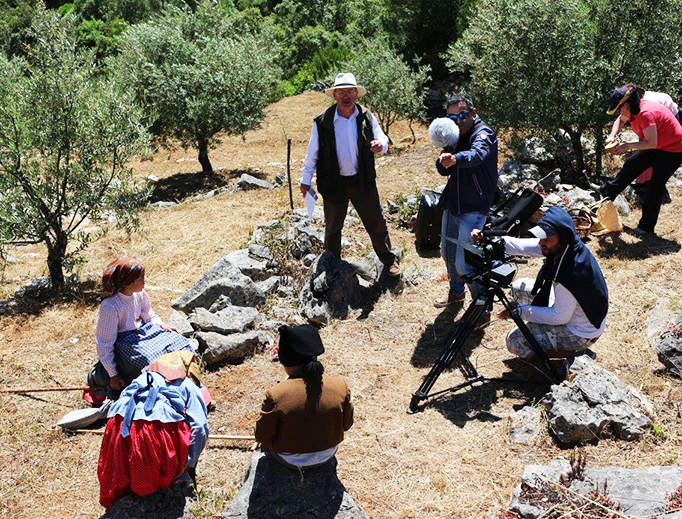EWTN and the Message of Fatima
“It was hard work but worth every minute.”

Recently, I was standing on the concourse of a London railway station. I was awaiting the arrival of the film director Stefano Mazzeo.
You may not recognize the name. If you have watched EWTN in the last months, however, then you will have seen his work. He is the man behind the Fatima series that EWTN has produced for the centenary of the Portuguese apparitions. It was one of the largest productions ever mounted by EWTN, co-produced with the UK based, St. Clare Media. The eight-part series, called The Message of Fatima, has taken over two years to produce and was filmed in five countries involving an extensive production team, a cast of principals, notably child actors and a stream of film extras. Behind it all there was one man guiding the series to completion and, now, here he was coming toward me.
Mazzeo looked exhausted. He had come from his home on Merseyside to London early that morning to work on voice-overs for the series; the final episodes are due to air later this month. He was hauling a large suitcase filled with sound equipment and looked like he needed a coffee so we found a nearby café and sat down.
“When all is said and done,” Mazzeo explained as he stirred his coffee, “the final series length will be around five hours.” And yes, he is tried, understandably perhaps. For the record, his last vacation was in November 2015. And since then, he has been working alongside not one but two production teams in both England and Portugal. “The production,” he says, “takes over your life.” From the start, the project has been a challenge and, as with any film production, there have been many – some curious – difficulties along the way: audio tracks mysteriously going missing requiring days spent re-shooting footage; a vicious attack by mosquitoes on members of the crew. Mazzeo and his team have suffered for their art and, more importantly, for promoting the message of Fatima. One senses, though, that he has also thoroughly enjoyed many aspects of the creative journey, especially now that the finishing line is so nearly in sight.
Just spending a brief time with Mazzeo listening to what he has achieved and what he is hoping to do, it is no wonder he looks so tired. I ask him how he keeps going.
“It’s all about having a good team around you, once you have that, then anything is possible.”
Refreshingly, he sees his role as director not as dictating what must happen so much as allowing the assembled team “to own parts of the production.” In fact, he goes out of his way to employ people who will “contribute creatively.” His part, he says, is to draw the best out of all concerned: actors, technicians and the production team – as well as making sure that every dollar is spent as efficiently as possible.
It’s not just the team ones sees that is important to him either. He reported how cloistered nuns at a shrine near the EWTN studios in Alabama have him and his mission firmly within their sights and in their prayers. He appreciates their support, especially as the long days make it hard for him to pray. He tried to say a daily Rosary when he was working on the Fatima series but admits that, more often than not, soon after the day’s filming wrapped he was asleep before his Rosary was complete.
It is obvious that Mazzeo is no jobbing filmmaker. He sees his work as a “ministry, an apostolate,” and as part of a personal calling to turn the art of cinema away from the darkness that so often appears to consume it and, instead, direct it toward the light of Christ. Unapologetically, he is a Catholic filmmaker. The subjects he has covered in his films would suggest as much: the Crusades, the Inquisition, as well as the history of Catholicism in Wales. His next project after Fatima is a series of docudramas on the 16th century Protestant Revolt, commonly known as the Reformation. Mazzeo hopes to begin work on this, another EWTN production, toward the end of 2017.
Evidently, Mazzeo is a man who has accomplished much. Only this month, for example, The Message of Fatima won a prize at the Niepokalana 32nd International Catholic Film Festival in Poland. It is not Mazzeo’s first festival award and one suspects it will not be the last. But his achievement is not just the many film productions he has completed over the last years but also their scale and ambition. Nonetheless, he has plans for even more ambitious projects. In the coming years, he wants to make a feature film. He is working on an idea presently. His goal is to make such a film and then to ensure that it has as wide a distribution as any mainstream release. His view of Catholic cinema is truly catholic: one that evangelizes the culture around it.
Too soon after meeting, regrettably, our time was up. Mazzeo had to catch another train to the recording studio that now awaited him. As he moved to go, I asked him what he had learned most from the Fatima experience over the last two years.
He paused and thought.
“I'm sure that Our Lady was looking out for us. I hope she is pleased with what we have done.”
The train was announced as ready to leave, and hastily we said goodbye. Then, as he turned to go, he added: “It was hard work but worth every minute.”
With that, Mazzeo disappeared onto yet another train. Once more I was standing on the station’s concourse but this time I was left wondering if, in that final comment, I had just been told something of the Fourth Secret of Fatima.















